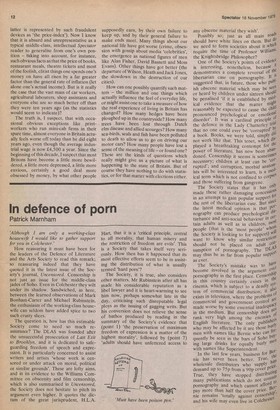In defence of porn
Patrick Marnham
'Although I am only a working-class housewife I would like to gather support for you in Cokhester.'
How reassuring it must have been for the leaders of the Defence of Literature and the Arts Society to read this remark; so reassuring indeed that they have quoted it in the latest issue of the Society's journal, Uncensored. Censorship is not just , an issue for the middle-class jades of Soho. Even in Colchester they wilt under its shadow. Sandwiched, as here, between the learned observations of Mark Bonham-Carter and Michael Rubinstein, the enthusiasm of the working-class housewife can seldom have added spice to two such crusty slices.
The question is, how has this estimable Society come to need so much reassurance? The DLAS was founded after the unsuccessful prosecution of Last Exit to Brooklyn, and it is dedicated to safeguarding freedom of speech and expression. It is particularly concerned to assist writers and artists 'whose work is censored or under attack on moral, political or similar grounds'. These are lofty aims, and in its evidence to the Williams Committee on obscenity and film censorship, which is also summarised in Uncensored, the Society does not hesitate to pitch its argument even higher. It quotes the dictum of the great jurisprudent, H.L.A. Hart, that it is a 'critical principle, central to all morality, that human misery and the restriction of freedom are evils'. This is a Society that takes itself very seri ously. How then has it happened that its - most effective efforts seem to be in assist ing the distribution of what is usually termed 'hard porn'?
The Society, it is true, also considers other matters. Mr Rubinstein after all has made his considerable reputation as a libel lawyer and it is heart-warming to see him now, perhaps somewhat late in the day, criticising such disreputable legal ploys as the issuing of gagging writs. But his conversion does not relieve the sense of bathos produced by reading in the summary of the Society's evidence that (point 1) 'the preservation of maximum freedom of expression is a matter of the highest morality', followed by (point 7) 'adults should have unfettered access to Possibly so; just as all main roads should have white lines on them. But do we need to form societies about it which require the time of Professor Williams, the Knightsbridge Philosopher? One of the Society's points of evidence is interesting, nonetheless, because it demonstrates a complete reversal of the is libertarian case on pornography. It suggested that, in future, those who Publ. ish obscene material which may be Seerl or heard by children under sixteen shoal° be penalised 'if it is established by triej.c1; ical evidence that the matter rnigu; reasonably be expected to cause the chilu, pronounced psychological or emotional, disorder'. It was a cardinal principle the defence in the Lady Chatterley triw that no one could ever be 'corrupted' a book. Books, we were told, simplY not work like that. This tenet, which ciP. played a breathtaking contempt for the power of literature, has now been ail° doned. Censorship it seems is sometiMes necessary; children at least can be `enr. rupted'; and corruption, morbid anatorii` ists will be interested to learn, is a med. ical term which is not confined to corpses and those suffering from gangrene.
The Society states that it has ou" made these rather damaging concessions in an attempt to gain popular support Of the rest of the libertarian case. But since the latest medical opinion is that P°,r. nography can produce psychological ch.' turbance and anti-social behaviour in ce.,,ri tam n adults as well as in children, people (that is the 'most people' w11°Ti the Society is looking to for support) oru, want to know why similar restriction' should not be placed on adult cons' sumption of pornography. The DI-Art may thus be as far from popular supPn as ever. The Society's mistake was to haver become involved in the argument ove, pornography in the first place. CensorshhiPe in this country certainly exists in t''‘ cinema, which is subject to a deadly tern of commercial distribution; it 315,4 exists in television, where the probleins "c commercial and government control ar made worse by some essential inadequac1 in the medium. But censorship does fly_f rank very high among the enemies English literature. The only publishef' who may be affected by it are those burl men with names like Bernie who can frequently be seen in the bars of Soho tulYr; ing large drinks for equally burly rile with names like Superintendent. In the last few years, business for 136,1, nie has never been better. True, tc; wholesale distributors who suPPIY demand up to 75p from a 90p cover True, they have stopped distribuni! many publications which do not CO to pornography and which cannot afford I., pay more than half the cover price. nie remains 'totally against censorsln!' and his wife may even live in Colchestef


































 Previous page
Previous page